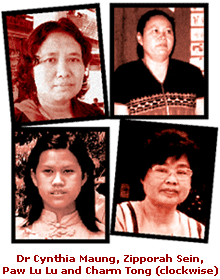In one instance, while carrying a red flag at the head of a group of demonstrators, she appealed to Burmese women to “show your hereditary pride and courage.” She was badly beaten by police in front of colonial administration buildings in
Rangoon but went on to deliver relief supplies and medicine to detained demonstrators.
“Daw Khin Myo Chit showed the way for our women to recognize our rights,” says writer May Nyein, who now lives in exile in Thailand. “She encouraged our women not to give up.”
Recognized for her community work in colonial-era Burma, Saw Hsa won the prestigious British civil award Member of the British Empire (MBE). She studied in Ireland, graduating in medicine, and attended numerous international conferences. In 1937 she became a member of the new Burma Senate.
 In the early years of Burma’s independence, several women played prominent roles in public life. Appointed by U Nu in 1953 to represent Karen State, Ba Maung Chein became the first and only Burmese woman to receive a cabinet-level position in the Burmese government.
In the early years of Burma’s independence, several women played prominent roles in public life. Appointed by U Nu in 1953 to represent Karen State, Ba Maung Chein became the first and only Burmese woman to receive a cabinet-level position in the Burmese government.
Perhaps the most influential woman of this period was Suu Kyi’s mother, Khin Kyi, chairman of the Women’s Association of Burma, who went on to build a successful career as a diplomat. In 1960 she was appointed Burma’s Ambassador to India, with special responsibility also for Nepal.
Khin Kyi was showered with international awards during her career. The US, Yugoslavia and Thailand all awarded her honors, while at home she won the Maha Thiri Thudhamma prize, given for services to Burmese social and religious life.
Ne Win’s military coup in 1962 curtailed, but did not entirely exclude, the involvement of women in affairs of state. Under Burmese Socialist Programme Party rule (1962-1988), nine women were elected to the first Pyithu Hluttaw, or People’s Assembly. In the subsequent election, that number rose to 14.
Veteran Burmese writer Daw Amar, now 89, won Burma’s Sarpay Beikman literature award for her book The Artists Whom People Love. She is still an outspoken champion of democracy and human rights.
As Burma now suffers under the stranglehold of yet another incompetent and oppressive military regime, Burmese women in exile have assumed the mantle of activism that is denied to so many at home.
Suu Kyi is certainly the most outstanding of the many Burmese women who have helped to draw the international spotlight on Burma in recent years. Now four other names can be added to the ranks. Dr Cynthia Maung, human rights activists Charm Tong and Zipporah Sein, and refugee worker Paw Lu Lu, are among 1,000 women worldwide nominated jointly by a Swiss movement for this year’s Nobel Peace Prize.
Cynthia Maung is a Karen medical doctor who runs a clinic for Burmese migrants, refugees and orphans in Mae Sot, on the Thailand-Burma border. In 1999 she was the first to win the US-sponsored Jonathan Mann award. The Philippines also honored her in 2002 with the Ramon Magsaysay award for community leadership.
 In the early years of
In the early years of 